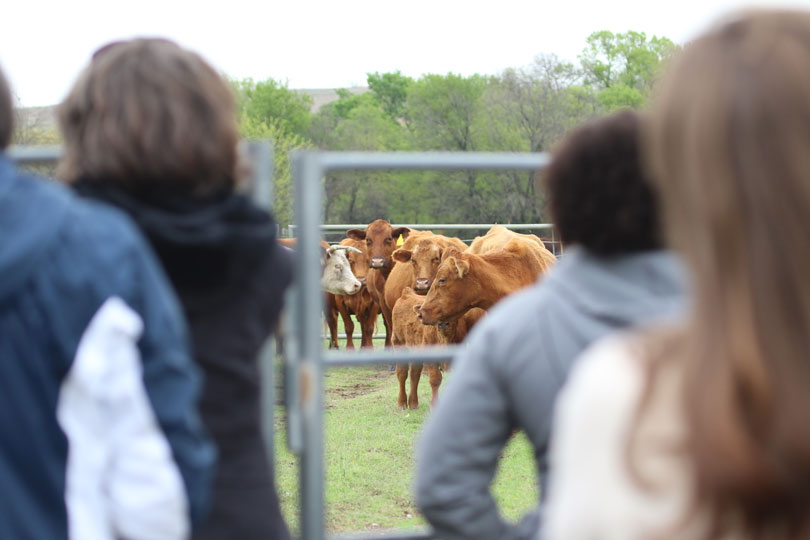By Justin Walker
Communications Specialist
A group of science, technology, engineering and math (STEM) teachers from across the nation attended a three-day workshop in Fort Worth covering the Texas beef industry this week.
On the Farm STEM, hosted by the American Farm Bureau Foundation for Agriculture (AFBFA) and sponsored by the Texas Beef Council, introduced more than 40 teachers and extension agents representing states from across the nation to varying aspects of beef operations. The group visited with farmers in North Texas and toured a meat processing plant, among other stops.
“The whole concept is based around showcasing the STEM concepts agriculture has,” Craig Rebich, an event facilitator with AFBFA, said. “Agriculture is the applied science of biology, chemistry and engineering. Many people forget those things, so this is a great way to showcase all those pieces.”
Tracy Friday of the Botanical Research Institute of Texas (BRIT) and Amy Hollandshead of Justin Northwest ISD attended the On the Farm STEM event in Los Angeles last year. Both Friday and Hollandshead stressed to their event facilitators that AFBFA had to come to Texas, especially if they were talking about beef.
“We were constantly comparing, ‘Oh in Texas, this is better,’ and, ‘In Texas, this is how we do it,’” Hollandshead said. “We told them they have to come to Texas if you really want to know what the beef industry is like. You have to come to Texas and you have to come to Fort Worth, Texas.”
Friday and Hollandshead both helped develop the week’s agenda, including scheduling farm visits.
The week began with a welcome dinner that featured talks with industry experts, including Texas Farm Bureau (TFB) President Russell Boening and TFB Director of Educational Outreach Jett Mason.
“The Foundation reached out to Texas Farm Bureau, Texas Beef Council, the Botanical Research Institute and Northwest ISD in November of last year to start planning this event,” Mason said.
The event included a trip to Burgundy Pasture Beef, where participants learned about the beef lifecycle, technology used in the lifecycle and engineering developments on the farm.
From there, the educators travelled to BRIT to meet with Dr. Guy Ellis of Merck Animal Health. Ellis discussed the role of veterinarians in beef cattle operations and addressed concerns regarding antibiotics.
Participants had the unique opportunity to tour the Standard Meat processing plant, where advancements in technology and engineering were on full display. Standard Meat leadership led a discussion after the tour about the need for STEM in their field as they face an aging workforce and less available labor. Many of the educators expressed their surprise with both the mechanical technology inside the plant and the fact that so much human labor is still in use.
The participants then met with Dr. Ron Gill at his ranch in Rhome, Texas. Gill discussed animal welfare and behavior and gave demonstrations on proper cattle handling techniques. He showed attendees how the use of a squeeze chute can actually decrease stress in cattle.
Tony Mayfield, a fifth grade teacher in Long Beach, California, was excited to attend the event to help introduce his students to agriculture.
“I wanted to promote (ag) to my fifth graders because I teach inner-city, urban kids who do not see any of that,” Mayfield said. “I want them to understand the food cycle and where their food comes from. I always talk to them about being the stewards in the future of the planet.”
Mayfield said it was great to see the entire process of raising cattle under proper care and conditions to the packaging of steaks and other beef products to be sent to the grocery store and restaurants. He said this week will help him stress the sustainability and future of agriculture to his students.
Hollandshead, who attended the Texas event as a participant, said other educators had similar experiences.
“Almost every expert we talked to today talked about why they do it and the importance of building those relationships,” she said. “It’s about animal welfare, but it’s also about human welfare and making those connections.”
Having these educators see those connections opens the opportunity for students in urban Texas areas to do so as well, Mason said.
“Making tho

